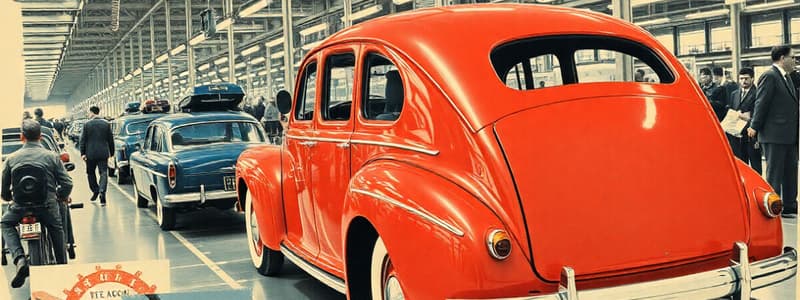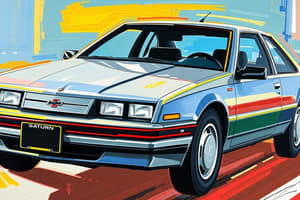Podcast
Questions and Answers
What significant event took place in 1908?
What significant event took place in 1908?
- Rise of hybrid vehicles
- Development of the first moving assembly line
- Introduction of the Ford Model T (correct)
- Invention of the first steam-powered vehicle
The first gasoline-powered vehicle was invented in the 1830s.
The first gasoline-powered vehicle was invented in the 1830s.
False (B)
What were the notable designs of electric vehicles in the 1890s?
What were the notable designs of electric vehicles in the 1890s?
Baker Electric
The rise of hybrid vehicles began in the ______ in response to climate change.
The rise of hybrid vehicles began in the ______ in response to climate change.
Match the following automotive developments with their corresponding decades:
Match the following automotive developments with their corresponding decades:
Flashcards
Benz Patent-Motorwagen
Benz Patent-Motorwagen
First gasoline-powered car, built in 1885.
Ford Model T
Ford Model T
Revolutionized auto industry with affordable prices.
Moving assembly line
Moving assembly line
Increased production efficiency and reduced costs.
Seat belts and airbags
Seat belts and airbags
Signup and view all the flashcards
Hybrid vehicles rise
Hybrid vehicles rise
Signup and view all the flashcards
Study Notes
Early Development
- 1830s: Invention of the first working steam-powered vehicle.
- 1885: Karl Benz builds the first gasoline-powered car, the Benz Patent-Motorwagen.
- 1890s: Emergence of electric vehicles alongside gasoline cars, with notable designs like the Baker Electric.
Mass Production
- 1908: Introduction of the Ford Model T, revolutionizing the automotive industry with affordable prices.
- 1913: Ford implements the first moving assembly line, increasing production efficiency and reducing costs.
Global Expansion
- 1920s-1930s: Rise of automobile culture in the United States and Europe; expansion of road networks.
- 1950s: Post-war boom leads to increased car ownership and the emergence of brands like Chevrolet and Volkswagen.
Technological Advancements
- 1970s: Adoption of safety features (seat belts, airbags) and emission controls due to regulatory changes.
- 1990s: Introduction of computer technology in vehicles (engine management systems, anti-lock brakes).
Environmental Concerns
- 2000s: Rise of hybrid vehicles (e.g., Toyota Prius) in response to climate change and oil crises.
- 2020s: Increasing focus on electric vehicles (EVs) and sustainability, with major manufacturers investing in EV technology.
Modern Trends
- Connected Cars: Development of smart and autonomous vehicles with internet connectivity and AI-driven features.
- Sharing Economy: Growth of car-sharing services and ride-hailing apps impacting ownership models.
- Legislation: Implementation of stricter emissions regulations pushing innovation in fuel efficiency and alternative energy sources.
Early Developments
- The first working steam-powered vehicle was invented in the 1830s.
- Karl Benz created the first gasoline-powered car, the Benz Patent-Motorwagen, in 1885.
- Electric vehicles competed with gasoline cars in the 1890s, with notable models like the Baker Electric.
Mass Production
- The Ford Model T was introduced in 1908, making cars more affordable and accessible.
- Ford implemented the first moving assembly line in 1913, which significantly increased production speed and lowered costs.
Global Expansion
- Car culture became prevalent in the United States and Europe during the 1920s and 1930s, accompanied by the expansion of roadway networks.
- Increased car ownership and the introduction of brands like Chevrolet and Volkswagen characterized the post-war boom of the 1950s.
Technological Advancements
- Safety features like seat belts and airbags were adopted in the 1970s due to regulatory changes.
- Computer technology began to be integrated into vehicles in the 1990s, including engine management systems and anti-lock brakes.
Environmental Concerns
- The rise of hybrid vehicles, like the Toyota Prius, in the 2000s was driven by concerns about climate change and oil price fluctuations.
- The 2020s have seen a significant shift towards electric vehicles (EVs) with major investments in EV technology by automobile manufacturers.
Modern Trends
- Connected cars are being developed with internet connectivity and artificial intelligence (AI) features.
- Car-sharing services and ride-hailing apps like Uber and Lyft are influencing car ownership patterns.
- Stricter emissions regulations are being implemented, driving innovation in fuel efficiency and alternative energy sources.
Studying That Suits You
Use AI to generate personalized quizzes and flashcards to suit your learning preferences.




